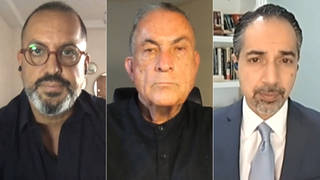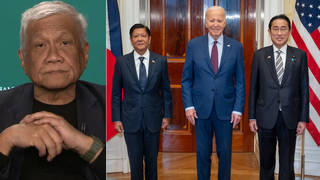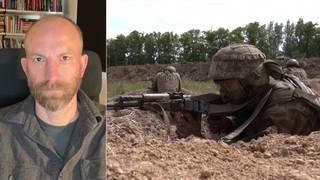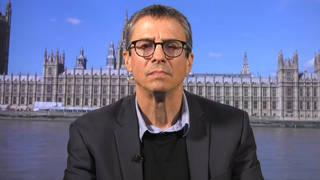
Related
Yesterday, the United Nations Security Council warned countries that violated sanctions against Angola’s UNITA rebels that they may face U.N. penalties for having helped the rebels to restart their war with the government. [includes rush transcript]
In a unanimously adopted resolution, the council gave the accused six months to challenge allegations in an independent report on embargo breaches and demonstrate their adherence to sanctions before the council considers taking action. While vague and lacking actual punitive measures, the resolution marked the first time the council has formally suggested applying so-called secondary sanctions on countries or individuals that violate U.N. embargoes, diplomats said.
In a groundbreaking report issued last month, an independent panel listed the violations of the U.N. fuel and arms embargo and ban on rebel diamond sales that enabled UNITA to restart a 20-year-old war with the government in December 1998, shattering a U.N.-brokered cease-fire.
Meanwhile, in Sierra Leone, rebel fighters control the diamond mines. They killed and maimed thousands during an eight-year war in that country. The 6,500 UN peacekeepers now stationed there are expected to receive 5,000 reinforcements by June. They are trying to safeguard the peace accord signed by Revolutionary United Front rebels and Sierra Leone government officials last July.
But peace is far from secure. Rebels still rape, rob and kill defenseless villagers in many parts of the country, according to human rights groups. And many rebels have refused to disarm. In the absence of jobs, they make money mining diamonds and smuggling them out of the country.
Guests:
- David Malone, Canadian foreign service officer and President of the International Peace Academy, an independent, non-partisan organization dedicated to promoting the peaceful settlement of armed conflicts between and within states. The IPA just released a book called ??The Sanctions Decade: Assessing UN Strategies in the 1990s.
- Ian Smillie, Associate with the Thomas J. Watson Jr. Institute at Brown University. He is co-author of a recent report by Partnership Africa Canada called “The Heart of the Matter: Sierra Leone, Diamonds and Human Security.” The report charges the diamond giant De Beers with involvement in the illicit Sierra Leone diamond trade.
- Lansana Gberie, a doctoral student at the University of Toronto and a research associate at the Laurier Centre for Military, Strategic and Disarmament Studies. He also collaborated on the report on diamonds and Sierra Leone. He worked as an investigative journalist in Sierra Leone between 1990 and 1996, and has written extensively on Sierra Leonean history and politics.
Related links:
Transcript
AMY GOODMAN: Yesterday, the UN Security Council warned countries that violated sanctions against Angola’s UNITA rebels that they may face UN penalties for having helped the rebels to restart their war with the government.
In a unanimously adopted resolution, the council gave the accused six months to challenge allegations in an independent report on embargo breaches and demonstrate their adherence to sanctions before the council considers taking action. While vague and lacking actual punitive measures, the resolution marked the first time the council has formally suggested applying so-called secondary sanctions on countries or individuals that violate UN embargoes.
In a groundbreaking report issued last month, an independent panel listed the violations of the United Nations fuel and arms embargo and ban on rebel diamond sales that enabled UNITA to restart a twenty-year-old war with the government in December of 1998, shattering a UN-brokered ceasefire.
Meanwhile, in Sierra Leone, rebel fighters control the diamond mines. The 6,500 UN peacekeepers now stationed there are expected to receive 5,000 reinforcements by June. They are trying to safeguard the peace accord signed by Revolutionary United Front rebels and Sierra Leone government officials last July.
But peace is far from secure. Rebels still rape, rob and kill defenseless villagers in many parts of the country, according to human rights groups, and they have refused to disarm. In the absence of jobs, they make money mining diamonds and smuggling them out of the country.
We’re joined right now by a number of people who are working on this issue. David Malone is the Canadian Foreign Service officer, on leave now, and president of the International Peace Academy, an independent, nonpartisan organization dedicated to promoting the peaceful settlement of armed conflicts between and within states. His organization has just released a book called The Sanctions Decade: Assessing UN Strategies in the 1990s. Ian Smillie is associate with the Thomas J. Watson Institute at Brown University. He has thirty years of international development experience and is a recent partner by Partnership Africa Canada called “The Heart of the Matter: Sierra Leone, Diamonds and Human Security.” Lansana Gberie is a doctoral student at the University of Toronto. He also collaborated on the report on diamonds in Sierra Leone. He worked as an investigative journalist in Sierra Leone between 1990 and '96 and has written extensively on the country's history and politics.
Today we’ll talk about corporations, diamonds and Sierra Leone. David Malone, why don’t we start with you, Canadian Foreign Service officer? Tell us about the connection between the corporations and diamonds in Sierra Leone.
DAVID MALONE: Well, there are different types of corporations involved in the diamonds trade. The trade is dominated by the DeBeers Company based in South Africa, but with interests that are fairly widespread. There are a number of intermediaries in various countries around Africa and elsewhere. And there are, of course, locally a number of actors, often international actors, who are engaged in the mining of diamonds, which is, in effect, the extraction of them often. So there’s a variety of actors, but somewhat less in the diamonds trade and in the oil trade than in many other areas of extractive industries. So, they’re easier to target, in other words.
AMY GOODMAN: Ian Smillie of the Institute at Brown University, associate with Thomas J. Watson Institute. Talk about how the corporations work with the rebels in Sierra Leone.
IAN SMILLIE: Well, there’s different levels of, let’s say, collaboration and different levels of corporation. I mean, when we talk corporation and diamonds, we often think of DeBeers, because they’re the biggest, but there are on the fringes of the diamond industry all kinds of sharks and bottom-feeders, as well. And that tends to be the norm in Sierra Leone. You get a lot of organizations, small, junior mining companies, and so on, that are in there looking for a chance, and, in fact, many of them — we’ve often said many of them are mining the stock market more than they are mining diamonds.
A part of the diamond industry that isn’t very well known — we talk a lot about DeBeers, but 70% of the world’s diamonds go through DeBeers. But DeBeers sells them, and a huge amount of the diamonds go to Antwerp, so 70% of the world’s diamonds also go through Antwerp. And there, you have hundreds of smaller dealers, cutters, traders and all the rest of it, and they are probably the biggest part of the problem after the diamonds get out of Sierra Leone.
AMY GOODMAN: How aware is the rest of the world about this corporate connection, and what do you think has to be done about it?
IAN SMILLIE: Well, I don’t think people are aware at all. I mean, diamonds are a symbol of love and purity. DeBeers advertises extensively. Last year their advertising budget was $200 million. DeBeers doesn’t actually sell any diamonds to the public. It’s really just advertising for the people who do sell diamonds.
Our concern about Sierra Leone is that the diamonds have been used to pay for the war. Diamonds are being smuggled out of Sierra Leone at an alarming rate. Last year, the government said there were only 8,500 karats exported officially from Sierra Leone. Our guess is that at least half-a-million, maybe a million karats went out through Liberia. They went to Liberia, they were used to buy weapons, which went back into Sierra Leone and have fueled the war.
Probably something like 10% of the world’s diamonds are stolen, 40% of the diamonds coming out of Russia are stolen, 7% of South African diamonds are stolen, practically all of Sierra Leone’s diamonds are stolen. All of these go into, let’s call them, fencing nations, like Liberia, and they’re used to buy guns, they’re used to launder drug money, they’re very dangerous.
And so, people buying diamonds, when you go into a jewelry store to buy a diamond, you don’t know where it’s come from. Let’s say nine out of ten are clean, but you really don’t know where the tenth one came from. The tenth one probably comes out of a war situation and has been used to buy guns and fuel war in some of these countries.
AMY GOODMAN: Lansana Gberie, what do you think is the most important issue to understand about what’s happening in Sierra Leone and the trade that’s financing the war, the diamond trade?
LANSANA GBERIE: I think the most important issue is the connection with the Liberian bandits. The government in Liberia is certainly very complicit in the whole carnage in Sierra Leone, and the connection must be made to the diamond industry, because the Liberian government is certainly interested in looting Sierra Leone’s diamond wealth. These diamonds pass through the Liberian government, and there are all kinds of shady dealers, all kinds of arms dealers in Liberia, and even drug dealers who are there and who loan their drug money and then get the diamonds, which are, well, supposed to be relatively very clean, and they are exported from Liberia into places like Belgium, as Ian has already stated.
So I think the real issue about the Sierra Leone war is that resources, especially diamond resources, which will have been used to develop the nation, is being used to kill little babies, cut off their hands, and destroy a whole future for a nation of 4.5 million people.
AMY GOODMAN: You have DeBeers purchasing the majority of all diamonds produced, controlling two-thirds of the world’s diamonds. In '98, the market worth $6.7 billion. The company directly involved in Sierra Leone until the eighties. It maintains a trading company in Liberia and an office in Guinea. Both countries produce few diamonds. Liberia is the transit point for the smuggled Sierra Leonean diamonds, and the company says it doesn't purchase Sierra Leonean diamonds, but it’s impossible that they’re not purchasing these smuggled diamonds. So what do you recommend? Let’s put that question to David Malone, Canadian Foreign Service officer and president of the International Peace Academy.
DAVID MALONE: Well, actually, I’d rather — I agree with everything Lansana and Ian have said so far. It’s a rather technical question you’re raising, and I’d rather it was directed at them, because you’re more likely to get a competent response.
AMY GOODMAN: David Malone?
IAN SMILLIE: Well, it’s very complicated. DeBeers — I mean, the diamond industry is almost medieval, in the sense that one company controls 70% of the world’s production of diamonds. And you said $6.7 billion; that’s $6.7 billion worth of rough diamonds. By the time those diamonds turn into jewelry, that’s over $50 billion a year. It’s a huge industry, and DeBeers is obviously at the center of it.
Partly in reaction to our report, DeBeers has said that they will not buy any conflict diamonds. They will only buy diamonds, in future, from their own mines — of course, they have a huge number of mines themselves — and from legitimate companies in countries like Canada and Russia and Namibia and Botswana. They’ve said they won’t buy any diamonds that have any shadow on them. The problem is, how do we know what they’re buying? How do we know where the diamonds come from? They haven’t said how they’re going to explain this. It’s going to be very important.
One of our recommendations was that there should be an international body looking at the diamond industry as a whole. There should be something that — it could have industry representation in it, but it should have government, law enforcement agencies and others involved. Diamonds are a huge export from Australia, from Russia, from a lot of developing countries like South Africa, from Canada, and so on. This is a global problem. It isn’t just Angola and Sierra Leone. The rot at the edges of the diamond industry is huge, and it really needs some kind of international oversight, not just one company.
AMY GOODMAN: Lansana Gberie, do you think that DeBeers should be sanctioned?
LANSANA GBERIE: Well, in our reports, we went very light on DeBeers. We thought, well as much as they are part of the problem, they could also be part of a solution. You know, they are very [inaudible] that control about 70% of the world’s diamonds, give them enough leverage over the whole diamond industry. So we have been trying to see whether we can convince them to reform the system, to be more active in trying to get interested in areas that have been destroyed by the diamonds.
AMY GOODMAN: To say the least, DeBeers has quite a history going — looking at South Africa during apartheid and the profits it made off of the South African black miners.
LANSANA GBERIE: Oh, certainly. I mean, they have obviously a very notorious history in that sense, but they also have some positive history, in the sense that when they were operating in Sierra Leone, at least, the diamond industry was fairly stable. But the moment they pulled out and when they pulled out, while they have an interest obviously in mopping up the diamond supply so as to keep the prices stable, so they might have been dealing in several ways with smuggled diamonds from all these countries, especially Sierra Leone.
But in order to — well, we thought that it is probably worthy to encourage them to open an office in Freetown in order, you know, to come out openly and to deal openly so that they may under-cost the small guys and all the shady dealers. And the real problem now is all these small, small companies, the bottom-feeders, as Ian said, who are all over the place, and they are supplying guns in exchange for diamonds. So maybe a more open, a more transparent DeBeers can help solve the problem in a way.
AMY GOODMAN: Ian Smillie, last comment, as we wrap up.
IAN SMILLIE: I want to talk a little bit about, for a moment, just about the Belgian connection in Liberia. Over the last five years, Liberia, which has a very, very small amount of diamonds of its own — never exported more than 100,000 karats — over the last five years, Liberia has exported over 30 million karats of diamonds openly to Belgium. The Belgian government, the Belgian industry has looked the other way. They know these are stolen diamonds, and they have looked the other way. The Belgian government needs to get control of the Belgian industry, as well. The Belgian industry is seriously complicit in the theft of diamonds, not just from Sierra Leone, but from Angola, as well.
AMY GOODMAN: And, Belgium’s history in Africa, going back to King Leopold and the Congo.
LANSANA GBERIE: Oh, yeah. Very, very notorious, too. You know, I mean, they caused so much destruction in the Congo in the nineteenth century.
AMY GOODMAN: Can you talk about the symbolism of the hands?
LANSANA GBERIE: Yeah, the symbolism of the cutting off the hands of African workers, where people may be using this as a tactic to intimidate the African workers. I mean, there was a kind of very sustained slavery going on in the Belgium Congo. Some people are now speculating that in fact the RUF may have learned the tactics of the cutting off the hands of children from the Belgians. Foday Sankoh, as you know, was a member of the peacekeeping — UN peacekeeping force in the Congo in the early '60s, so he might have heard stories of, you know, the Belgians cutting off the hands of people, and he might have thought that this tactic was very, very effective, and he has used it so effectively. You know, he says, “Don't vote,” he cuts off the hands of a few people, people are intimidated, they won’t vote. He says “OK, don’t harvest your farms,” cuts off the hands of a few peasants, and people run away.
AMY GOODMAN: We have to break for stations to identify themselves. When we come back, I have one last question. Do you see this issue of DeBeers in Sierra Leone or taking the smuggled diamonds of Sierra Leone and bringing them to Belgium, to the rest of the world, do you see it connected in any way to the uprising we’re seeing in this country against corporate globalization?
You’re listening to Pacifica Radio’s Democracy Now! Our guest has been David Malone, Canadian Foreign Minister officer and president of the International Peace Academy. We thank you for being with us. The book just released by his organization, The Sanctions Decade: Assessing UN Strategies in the ’90s. We’ll come back for a minute with Ian Smillie of Brown University and Lansana Gberie, a student at University of Toronto from Sierra Leone. Stay with us.
[break]
AMY GOODMAN: You are listening to Pacific Radio’s Democracy Now!, as we talk about a new report just out, looking at Sierra Leone, diamonds, DeBeers, Belgium and Liberia. We’re going to go to the sounds of the battle after Seattle in just a minute, but as we lead into it, I wanted to ask this question about the massive uprisings we’re seeing now in the United States, from Seattle in November/December to Washington, D.C over this past weekend, that are looking at the connections between Western countries, corporations, exploitation of developing countries, particularly in Africa, Asia and Latin America. What connection do you see, Ian Smillie, and then Lansana Gberie, Ian Smillie of Brown University?
IAN SMILLIE: Well, our contention is that the diamonds are fueling war. A lot of the diamond industry is clean, but 10% is not clean. It’s got blood all over it. And I think what the average consumer should worry about is those 10% of the diamonds. If you’re going to buy a diamond ring for an engagement or wedding, ask the jeweler where the diamond comes from. He’ll probably tell you he doesn’t know. Don’t take that at face value. Insist that you have to know where the diamond comes from. Go somewhere else if he can’t tell you. Sooner or later, they will have to track the diamonds back and find out which ones are clean and which are dirty.
AMY GOODMAN: And, Lansana Gberie, of Sierra Leone.
LANSANA GBERIE: Just to add that the unrestrained nature of this so-called globalization in which we are seeing big corporations operating in a very, very unethical way in several African and other third world countries reminds one of the eighteenth and the seventeenth century era of mercantilism. You had whole corporations using mercenaries to ravage areas that are very marginal to the world economy. And it’s the same thing happening all over again. Most of these corporations are aligned to — I mean, they have mercenaries who are operating under them, and they are simply exploiting resources in areas that are so far away from the Western economies. They operate almost as law unto themselves, so I think the kind of consciousness which we saw at Seattle and other places reflects this kind of unease about the big power of big corporations all over the world.
AMY GOODMAN: If people want to get a hold of your report, Partnership Africa Canada, called “The Heart of the Matter: Sierra Leone, Diamonds and Human Security,” where can they call or go on the web?
IAN SMILLIE: I think the best place to go is to the Sierra Leone web. You can get it at Sierra-Leone.org. You’ll find it under “documents.”
AMY GOODMAN: And that’s Ian Smillie of Brown University, thirty years of international development experience. Lansana Gberie, a doctoral student at the University of Toronto and research associate at the Laurier Centre for Military, Strategic and Disarmament Studies, who collaborated on that report “The Heart of the Matter: Sierra Leone, Diamonds and Human Security.”












Media Options